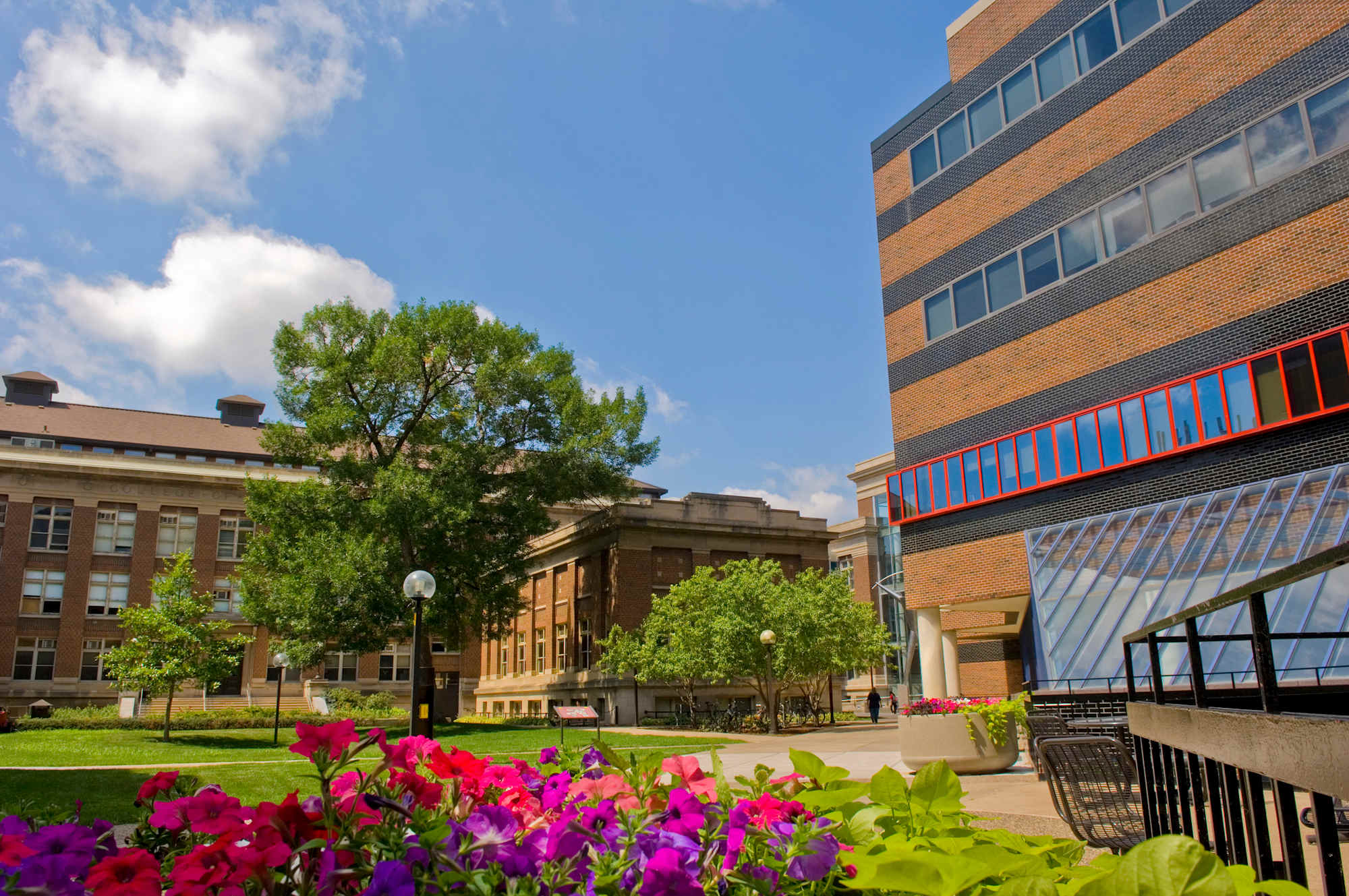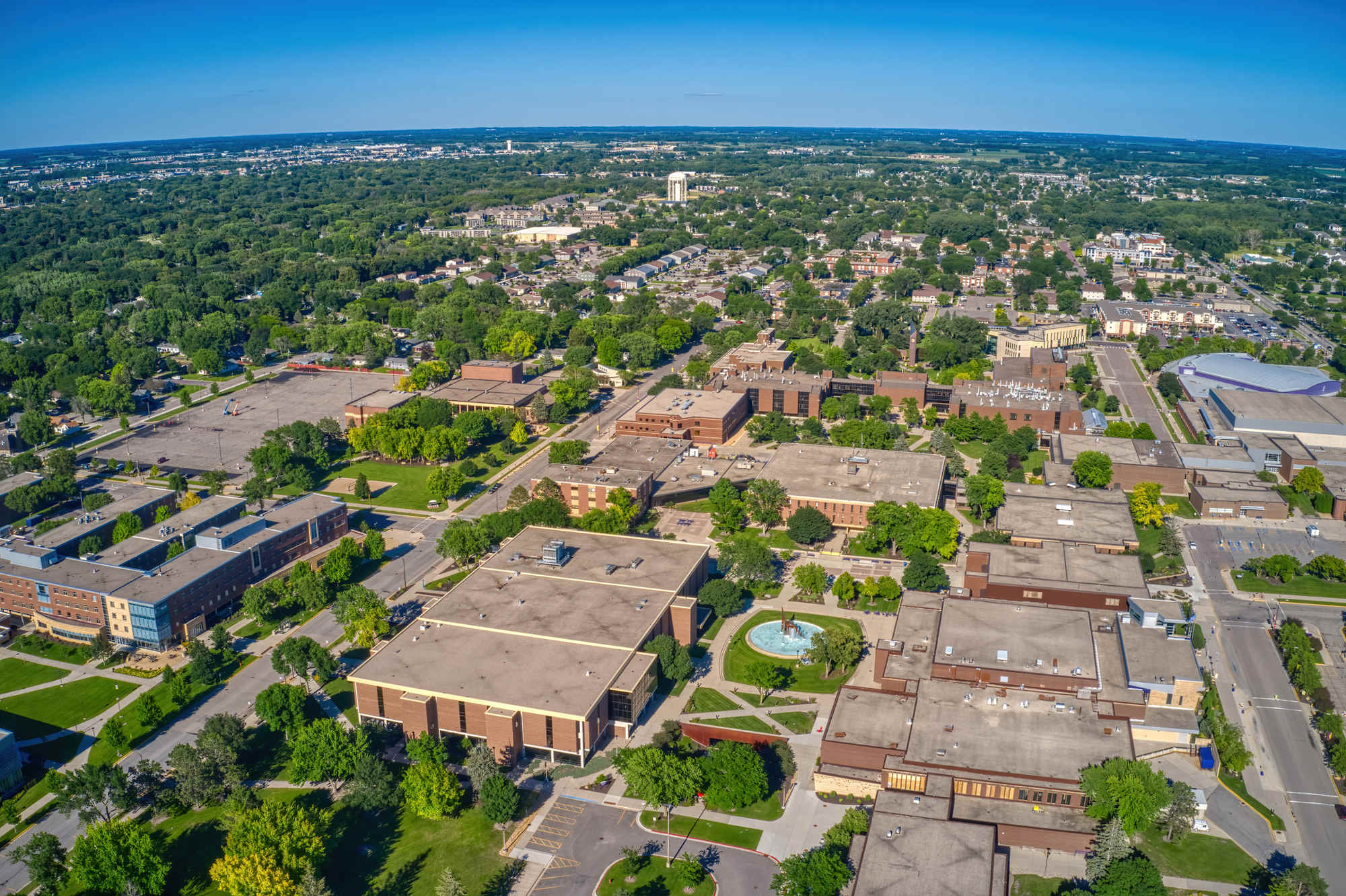MBA Programs in Minnesota
Minnesota is home to the Twin Cities of Minneapolis and St. Paul, 17 Fortune 500 companies, and over 10,000 lakes.
The state’s high median salary for workers, lower-than-average cost of living, and low poverty rate make it a beacon for businesses of all sizes.
If you’re interested in working in a state with a strong economy and being around diverse businesses, consider braving the chilly winters and pursuing an MBA in Minnesota.
3 Popular Business Schools in Minnesota
The following MBA programs were selected based on their enrollment numbers, selectivity, academic quality, and popularity.

University of Minnesota Twin Cities
The University of Minnesota’s Carlson School of Management is one of the top military-friendly business graduate schools, with highly ranked faculty nationally and internationally.
UMN reports that 96% of full-time MBA graduates receive job offers within 90 days of graduation. This is likely due to a unique resource—UMN has one career coach for every eight students.
Carlson also boasts a management science MBA and a global MBA program. The full-time MBA program costs $45,600 a year for Minnesota residents and $59,040 a year for non-residents. However, 90% of the class of 2023 received a scholarship.
MBA Specializations
Entrepreneurship & Innovation | Finance | Food & Agribusiness | Information Systems | Management | Marketing | Medical Industry Leadership Institute | Supply Chain & Operations
Application Requirements
- Resume and transcript
- Three essays
- Video essay
- Two professional recommendations
- GMAT or GRE test scores
- $75 application fee
- Interview by invitation only

Minnesota State University Mankato
Minnesota State University Mankato’s MBA program teaches managerial skills, ethics, and leadership through critical and analytical thinking and real-world applications.
The two-year online structure offers flexibility with synchronous and asynchronous deliveries. Classes are taught in eight-week modules, with six weeks of electives. Thirty-four credits are required to complete the program.
The stand-alone business leadership graduate certificate can be used for completing courses in the MBA program. The MBA program charges $838.60 per credit in tuition and $13.80 per credit in fees.
MBA Specializations
Business Analytics | Healthcare Administration | Leadership | Organizational Change and Development
Application Requirements
- Resume and transcript
- GMAT scores
- $40 application fee
- For international students: TOEFL iBT score of 61+, or IELTS score of 6.0+
University of St. Thomas
University of St. Thomas’s Opus College of Business offers a part-time MBA, an online MBA in healthcare, and an executive MBA. All three programs have an international requirement of either an international business course or short study-travel experience.
The part-time program can last 2–7 years and is offered in online, in-person, and hybrid formats.
The healthcare MBA is offered in a cohort learning model with several three-day residencies on campus per year. Most participants in the healthcare MBA have over 10 years of work experience.
The executive MBA is for students with an average of 15 years of work experience. It lasts 21 months and is also a cohort model. The part-time flex MBA costs $63,450.
MBA Specializations
Accounting | Business Law | Management | Operations Strategy | Technology
Application Requirements
- Resume with at least two years of work experience
- Three essays
- Transcripts
- International students: video interview and English proficiency tests.
Full List of MBA Programs in Minnesota
Explore this list of public and private MBA programs across Minnesota.
We only include schools with programmatic accreditation from the following organizations to ensure your investment in your education is secure:
- Association to Advance Collegiate Schools of Business (AACSB)
- Accreditation Council for Business Schools and Programs (ACBSP)
- International Accreditation Council for Business Education (IACBE)
All Business Schools in Minnesota
| School⇅ | City⇅ | Type⇅ | Accreditation⇅ |
|---|---|---|---|
| Augsburg University | Minneapolis | Private | ACBSP |
| Bethel University | St. Paul | Private | ACBSP |
| Capella University | Minneapolis | Private | ACBSP |
| Metropolitan State University | Minneapolis | Public | ACBSP |
| St. Catherine University | St. Paul | Private | ACBSP |
| University of Minnesota Crookston | Crookston | Public | ACBSP |
| Walden University | Minneapolis | Private | ACBSP |
| University of Minnesota Twin Cities | Minneapolis | Public | AACSB |
| University of Minnesota Duluth | Duluth | Public | AACSB |
| University of St. Thomas | Minneapolis | Private | AACSB |
Why Earn Your MBA in Minnesota?
Earning an MBA in Minnesota can lead to abundant job opportunities. Studying in Minnesota offers you strong support for education, proximity to corporations’ headquarters, and an excellent environment for personal and professional growth.
According to the Bureau of Labor Statistics (BLS), Minneapolis-St. Paul typically maintains an employment rate above 97%, with many people working in professional, business, and financial services. The region boasts a long history of growth and a powerful entrepreneurial culture. Minnesota is home to many large corporations, including Best Buy, 3M, and Target.
Business students can pursue graduate degrees at 56 four-year public or private colleges and universities of various sizes across the state. Many schools also offer online programs, making them easy to access for professionals serving in rural locations.
Minnesota students can receive scholarships to help cover the cost of MBA tuition. Many of the state’s colleges offer aid to military members, AmeriCorps volunteers, and students with exemplary leadership or academic achievements.
MBA Cost in Minnesota
MBA programs can be expensive — the average MBA program costs $63,000.
Fortunately, there are scholarships and grants, student loans, employer reimbursements, and veteran and military service member funding to help offset costs.
Graduate schools may also offer their own scholarship opportunities, and public schools tend to be cheaper for in-state students.
Business, management, and marketing graduate school tuition in Minnesota cost an average of $18,991 as of 2020, according to the National Center for Education Statistics. This is lower than the national average cost of an MBA.
MBA Jobs in Minnesota
With your MBA, you can become a personal financial advisor, human resources manager, public relations manager, or financial manager. Of professionals with MBAs, marketing managers and chief executives tend to earn the most in Minnesota.
| Job | Minnesota Average Annual Salary (May 2023) |
|---|---|
| Chief Executives | $246,170 |
| Marketing Managers | $174,660 |
| Financial Managers | $165,340 |
| Sales Managers | $160,910 |
| Human Resources Managers | $155,360 |
| Personal Financial Advisors | $155,360 |
| Purchasing Managers | $151,410 |
| Compensation and Benefits Managers | $149,550 |
| Public Relations Managers | $147,650 |
| Administrative Services Managers | $147,070 |
Frequently Asked Questions About Business Schools in Minnesota
The University of Minnesota’s business school has between a 37% acceptance rate and a 47% acceptance rate, making it relatively hard to get into.
Accepted students had a median GMAT score of 680 and an average of six years of full-time work experience. Typically, cohorts consist of 100 students, and accepted students have an average undergraduate GPA of 3.5.
Explore More College Resources

Best Colleges in Minnesota
The higher education experts at BestColleges reviewed the top 4-year colleges in Minnesota. Learn more about Minnesota’s best schools.

by Hannah Muniz
Updated October 4, 2024


